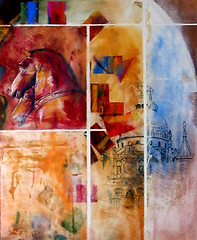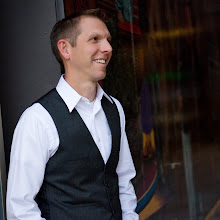[Image is from the “Romance and Foreboding” series by my dear friend Jay LeVasseur: http://www.appliedartstudio.com]
“Are you sitting down?”
“Yes” I replied with hesitation.
“We have named him Grayson Mitchell Lewis...”
Joyfully devastated, I sit in silence with a quivering lip.
“Yeah, bro we gave him that name because we know this really cool guy named Mitch. What do you think?”
Barely able to speak, I softly utter “I am honored.”
It was squarely in the middle of “one of those days” that I received the call. Jobe and Lyndsey were expecting on a day [she was to be induced] that was filled with the typical hazards of my profession. The cords of despair and self-pity were about to completely entangle me and a shaft of gladdening light graciously struck me. And so the day became a microcosm of life.
It is true isn’t it, that our lives are a confusing mixture of joy and pain – “romance and foreboding” as Curtis* described. The two are inseparable – co-mingled. Our little souls cannot avoid this bittersweet mixture and we rail against it.
What concerns me is that, exposed to the elements of this dichotomy, the human soul is subject to a “rust” of sorts. Cynicism and guardedness become our protection and eventually all is pain and foreboding. Our lives become busy, no – noisy pursuits of contrived pleasure. Real moments of holy satisfaction become a thing of fairy tales and naïve dreamers. We are less convinced that good will win in the end and, frankly, we stop looking for any evidence. And the soul begins to wither and lose its connection with a happy God.
I am convinced that this path is the most diabolical of all the corruptions of evil. Look around you. Consider the wickedness in the world. It seems righteous to callous yourself to the world and indict it. “The world is a fallen mess and, until rapture, will be nothing but.” A half-truth begins to deaden our sensitivity to the quiet voice of a God who is leaving clues – “all is not evil.”
Two months ago I took the advice of a close friend and watched “Hotel Rwanda.” It left me absolutely sick. I was sick that such evil could exist in the world and that I could barely be moved by it. I was sick that the Rwandan church, the American church and the world community sat silent during the slaughter of 800,000 in 100 days. Children killed and orphaned, women ripped from their homes and raped, men killed in front of their family – it seemed to be the crescendo of human depravity. Yet, the next evening I watched it again. Why? The story is not just about depravity. In the midst of this extreme darkness, good stood firm and illuminated. Paul Rusesabagina risked everything to save some. An old hunger to see good in the midst of evil was aroused. Thankfully evil had not completely aged me.
You see, when we lose the ability to see the romance, the shafts of light in this co-mingled existence, we age. Children possess a divine ability to be captivated by simple beauty and so Christ reproofs us all when he proclaims “unless you turn and become like children, you will never enter the kingdom of heaven.” Maybe Christ was speaking of an undoubting trust, but I am beginning to believe He was referring to the propensity to wonder. Aged and hardened by sins deceitfulness, our hearts lose their ability to “stand rapt in awe.”
“The most beautiful thing we can experience is the mysterious. It is the source of all true art and science. He to whom this emotion is a stranger, who can no longer pause to wonder and stand rapt in awe, is as good as dead: his eyes are closed.”
-Albert Einstein
Many of us feel that God has been silent, but how silent is a God who grants a sunrise every morning, a nest of freshly hatched robins and the gleeful laugh of a child? Before indicting this God of fresh, limitless wonders let us ask ourselves “Are we sitting down?” Are we prepared to be moved to tears by a divine interruption of beauty? Are we ready to enter, even for a moment, the Kingdom of Heaven? Or, in our cynical, sold out pursuit of cheap pleasure, have we grown older than our Heavenly Father.
“A child kicks his legs rhythmically through excess, not absence, of life. Because children have abounding vitality, because they are in spirit fierce and free, therefore they want things repeated and unchanged. They always say, “Do it again”; and the grown-up person does it again until he is nearly dead. For grown-up people are not strong enough to exult in monotony. It is possible that God says every morning, “Do it again” to the sun; and every evening. “Do it again” to the moon. It may not be automatic necessity that makes all daisies alike; it may be that God makes every daisy separately, but has never grown tired of making them. It may be that He has the eternal appetite of infancy; for we have sinned and grown old, and our Father is younger than we. The repetition in Nature may not be mere recurrence; it may be a theatrical encore. Heaven may encore the bird who laid an egg. If the human being conceives and brings forth a human child instead of bringing forth a fish, or a bat, or a griffin, the reason may not be that we are fixed in an animal fate without a life or purpose. It may be that our little tragedy has touched the gods, that they admire it from their starry galaxies, and that at the end of every human drama man is called again and again before the curtain. Repetition may go on for millions of years, by mere choice, and at any instant it may stop. Man may stand on the earth generation after generation, and yet each birth be his positively last appearance.
This was my first conviction; made by the shock of my childish emotions meeting the modern creed in mid-career. I had always vaguely felt facts to be miracles in the sense that they are wonderful: now I began to think them miracles in the stricter sense that they were willful. I mean that they were, or might be, repeated exercises of some will. In short, I had always believed that the world involved magic: now I thought that perhaps it involved a magician. And this pointed a profound emotion always present and sub-conscious; that this world of ours has some purpose; and if there is a purpose, there is a person. I had always felt life first as a story: and if there is a story there is a story-teller.”
-G.K. Chesterton
Wonder is the doorway to deep gratitude and deep gratitude is the doorway out of shameful self-pity and depression. For a time romance mingles with foreboding. Praise God that any romance exists at all. Recall soberly that each of us deserves only foreboding and the slightest radiance of good becomes a gracious taste of heaven that should be savored and marveled at. Those few who are sitting down, anticipating a shaft of God’s light in this darkness, happily enter the Kingdom of Heaven. Slow down. Quiet your soul. Be prepared. Not all is pain and sorrow. Evil has not prevailed. God is not silent.
“Are you sitting down?”
*Brent Curtis from “The Sacred Romance”, Curtis and Eldredge, Thomas Nelson, 1997
17 June 2005
Subscribe to:
Post Comments (Atom)










0 comments:
Post a Comment